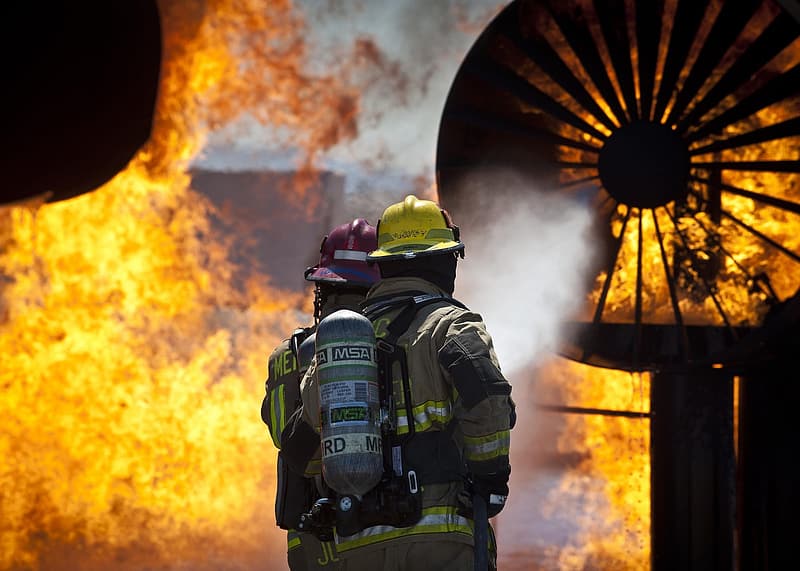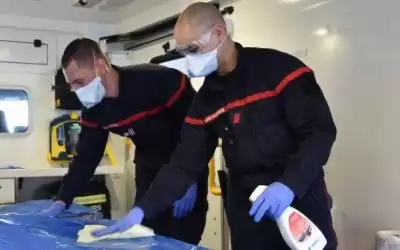For the last 5 years, I have been a volunteer fireman in a small fire station in the south of France. Like many other professions, we are mobilised to fight against the COVID-19 pandemic. And like our colleagues working in healthcare, we are doing our absolute best with the means available to us.
In the barracks where I work, the daily operational capacity (the number of officers physically present in the barracks) has been considerably reduced.
On-call duty is favoured in an effort to reduce the number of personnel in the barracks to a minimum. The aim here is to minimise the risk of contamination by restricting the flow of people in the fire stations. Nevertheless, on-call staff are expected to be called on for interventions and are therefore required to stay in close contact with colleagues in the barracks as well as with the hospital staff. The risk of contamination is thus always present.
Behind the medical and sanitary argument, there is clearly an economic issue: when not intervening on the ground, on-call staff receive only 9% of the hourly rate. They are therefore barely paid when they are not on duty, and must still be ready to go on any mission. In spite of the requirements of this extraordinary period, it is clear that the objective here is to keep expenditure down, whilst squeezing as much as possible out of workers.
As for the equipment at our disposal, we have been provided with FFP1 paper masks. We are also carrying out stock inventories on a regular basis. However, we are facing a shortage of supplies. In my barracks, we only have two masks per person and we are not even the worst off.
 Firemen are struggling with limited resources available to them / Image: Pikrepo
Firemen are struggling with limited resources available to them / Image: Pikrepo
Two weeks ago, the Secretary of State from the Minister of the Interior, Laurent Nunez, stated that there was no shortage of masks in France: I invite him to witness the reality on the ground. The problem is not the lack of human resources (especially since the majority of volunteers no longer work their regular jobs alongside this voluntary work), but the lack of protective equipment. There are centres that face a cruel deficit in this regard (shortage of masks, sanitary suits, gloves, etc.).
The smallest centres are the ones particularly affected by the crisis as they have to manage without any additional supplies and support. At first, wearing a mask was not compulsory, it all depended on the context and reason of the intervention. In case of suspicion of coronavirus, we had to wear one. In a neighbouring fire station, three firefighters were contaminated during interventions that were initially deemed risk-free.
Following several cases of contamination, the masks were made compulsory. Measures were taken only after incidents of contamination occurred within firemen. As in many other sectors, no measures were taken to anticipate the clear health risk. People's safety should be at the centre of all concerns, and yet, we are asked to spare equipment, at the expense of our safety and that of the people we are rescuing. There is no rhyme or reason to all this.
Finally, the information and directives that we receive are not always very clear. We have continuously needed to interpret, on our own, the flux of information communicated on an hourly basis. This requires a rigorous organisation to ensure that all our staff are aware of the guidelines and how to implement the new sanitary instructions: no more than three people in the same room, cleaning of surfaces and equipment with bleach, taking showers after each shift, etc.
I would like to end by expressing our present state of mind. We are determined and proud to carry out our missions, but in the face of a substantial lack of means, we are confronted with increasing levels of stress within the profession: especially since many of us have relatives who work in hospitals. As of now, we are not as badly affected by the pandemic as in other regions, however, it is imperative that equipment be sent to us in anticipation of a worsening of the situation.
When this crisis is over, many things will have to change, starting with a better appreciation of the profession. We must put an end to the massive recourse of precarious volunteers and we must be equipped with the necessary logistical means for our missions.

